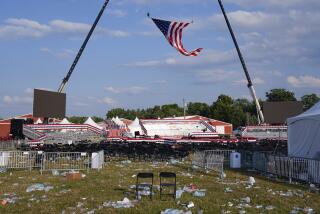NRA rejects Trump’s call for raising the age limit to buy rifles

NRA spokeswoman Dana Loesch said the gun lobby does not believe the age for purchases should be raised from 18
- Share via
Reporting from Washington — Amid an increasingly passionate nationwide debate over gun safety, the National Rifle Assn. on Sunday rejected President Trump’s call for a federal ban on rifle sales to those younger than 21, but a spokeswoman sought to play down the disagreement, suggesting Trump could change his mind.
The exchange illustrated the ways in which both allies and opponents of gun-law reform will have to maneuver gingerly when dealing with a president known for fluidity in his policy positions, especially in matters on which public opinion is at odds with the traditional views of his Republican party.
NRA spokeswoman Dana Loesch, interviewed on ABC’s “This Week” on Sunday, said the gun lobby does not believe the age for purchases should be raised from 18.
“You do not want to raise the age?” interviewer George Stephanopoulos asked. “That’s correct,” Loesch replied.
But she swiftly sought to minimize any policy differences with the White House, saying: “I know that people are trying to find daylight between President Trump and 5 million law-abiding gun owners.”
Raising the age requirement, Loesch said, was only a step that Trump was mulling, not a hard-and-fast commitment.
“These are just things that he’s discussing right now,” she said.
Federal law includes several different age limits for gun purchases. Licensed gun dealers cannot sell a handgun to a person younger than 21, but can sell a rifle to anyone 18 or older. Unlicensed sellers, such as those at gun shows, can sell handguns to those 18 or older and rifles regardless of age.
The older age limit for handgun purchases was put into law in 1968, when concealed handguns were the focus of gun control efforts and sales at gun shows had not yet emerged as an issue.
“It should all be at 21,” Trump said Thursday, predicting the NRA would support that limit. He has repeated that call several times.
The suspect identified by authorities as having shot and killed 17 people, mostly teenagers, at Marjory Stoneman Douglas High School in Parkland, Fla., is 19.
The debate in the aftermath of that shooting has left the NRA on the defensive amid a widening boycott campaign aimed at businesses with ties to the group.
Politicians, too, have been called out by a movement spearheaded by student activists, including some survivors of the mass shooting.
Among those young activists is David Hogg, a Stoneman Douglas student who in the wake of the shooting has emerged as an ardent and highly visible gun-safety advocate.
Interviewed Sunday on ABC’s “This Week,” Hogg said the NRA seeks to put forth the false impression that elected officials who receive campaign donations are not beholden to it.
“It’s just disgusting. They act like they don’t own these politicians. They still do,” said Hogg. “They’ve gotten gun legislation passed before in their favor, in favor of gun manufacturers.”
A few elected officials whose positions have long aligned with those of the NRA, including Trump and Florida Gov. Rick Scott, have expressed newfound support for raising the age limit for gun sales, either nationwide or at the state level.
“I’m an NRA member, a supporter of the 2nd Amendment and the 1st Amendment, and the entire Bill of Rights for that matter,” Scott said Friday in announcing his support for a package of gun control measures, including the age limit.
“I’m also a father and a grandfather and a governor,” he said. “We all have a difficult task in front of us balancing our individual rights with our obvious need for public safety.”
Many congressional Republicans have remained silent on the issue of tightening gun laws, however. Some have gotten behind Trump’s suggestion that some teachers should be issued weapons and trained in their use, an idea that has drawn strong criticism from educators.
“What you need is some of the teachers who are armed,” Rep. Thomas Massie (R-Ky.) said on NBC’s “Meet the Press” on Sunday.
In the interview, Massie also voiced strong opposition to weapons-free zones in and around schools, and likened calls for more stringent background checks to putting “lipstick on a pig.” He added that background checks and similar measures offer “false senses of security.”
“Criminals are going to get ahold of guns,” he said.
Another Republican lawmaker, Sen. Patrick J. Toomey of Pennsylvania, said he doubted the efficacy of raising the minimum age to buy a gun.
Toomey, who previously led a bipartisan bid to strengthen the background check system for gun purchases, said on NBC that the “vast majority” of people between the age of 18 and 21 were “law-abiding citizens who aren’t a threat to anyone” and thus increasing the age limit would not be a significant help.
“So I’m very skeptical,” he said.
Like Scott in Florida, several Republican governors are finding themselves under pressure to change their state laws.
Ohio’s Republican Gov. John Kasich said on “This Week” that people needed to “search your heart on this,” saying that the issue was finding “reasonable approaches to keep our community safe.”
Family members of some of those slain in the Parkland shooting vowed to keep up the pressure. Andrew Pollack, whose daughter Meadow was among the dead, told “Fox News Sunday” that “my daughter’s death cannot be in vain.”
More to Read
Get the L.A. Times Politics newsletter
Deeply reported insights into legislation, politics and policy from Sacramento, Washington and beyond. In your inbox twice per week.
You may occasionally receive promotional content from the Los Angeles Times.










